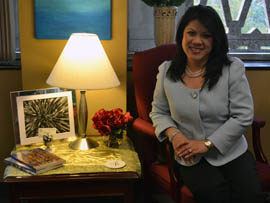Cronkite News has moved to a new home at cronkitenews.azpbs.org. Use this site to search archives from 2011 to May 2015. You can search the new site for current stories.
Lawmaker: Eliminate inequity in JTED funding for charter students
PHOENIX – Arizona’s mechanism for funding students who attend vocational programs offered by Joint Technical Education Districts unintentionally discriminates against those from charter schools, a state lawmaker contends.
The difference in per-student funding – about 30 percent less for charter schools than public school districts – sends the wrong message, said Sen. Kimberly Yee, R-Phoenix.
“Are we saying charter schools students’ educations are not as worthwhile?” she said.
When a student enrolls in one of Arizona’s 13 JTEDs, the state uses a formula to provide a larger share of funding that is divided under agreements between districts or charter schools and JTEDs.
For public school district students, that formula is 1.75 times the standard amount of per-student funding. For charter school students, it is 1.25.
SB 1104, authored by Yee, would make it 1.75 regardless of where a JTED student comes from.
The measure applies to JTEDs that have their own campuses or offer programs through community colleges or other spaces that aren’t on a public school district campus.
The bill won Senate approval and was awaiting action by the full House after winning endorsements from the Education and Appropriations committees.
Changing the formula for charter schools would cost the state $200,000 in fiscal 2014, according to the Joint Legislative Budget Committee.
Melissa Holdaway, CEO of Arizona Charter Academy, said in a Senate hearing that she worries unequal funding will lead to unequal treatment for charter school students. Parents have raised the same concern, she said, including the father of a student who hopes to attend a JTED.
“He’s concerned that it might create challenges for his daughter to prevent her from accessing the program,” Holdaway said.
Yee said that when enrolling students in vocational programs, some JTEDs may be choosing public school students first. She also said she has heard of JTEDs scheduling classes to conflict with those of charter school students.
“It’s a budget issue for them,” Yee said. “It’s all about the dollar.”
But Rusty Bowers, director of external affairs for the East Valley Institute of Technology (EVIT), said this is “absolutely not” the case.
“We screen every student in,” he said. “It’s better for us to have any student in the class learning the trade.”
Bowers said it’s important for all Arizona students to have the chance to become more invested in their futures.
“Kids that take these courses with rigor and relevance graduate at a higher rate, go to school in higher numbers, graduate from college,” he said. “There is a broader impact and benefit to this dual education than just learning how to be an auto tech or a chef.”
Bowers said EVIT is wary of simply providing equal funding for all JTEDs.
“All JTEDs are not created equal, and that’s literally true,” he said. “There’s differing levels of work and effort in holding these together.”
Harry Kressler, superintendent of three charter schools operated by Tucson’s Pima Prevention Partnership, said equal funding would allow all schools to use vocational programs on a larger scale.
“Students learn how to be a little more pragmatic,” Kressler said. “You need a skill to get a decent-paying job, and for a student to achieve that, it’s a good strategy for them.”
Eileen Sigmund, president of the Arizona Charter Schools Association, said the current funding formula isn’t enough for charters or JTEDs.
“Some kids are not worth less than others,” she said.
Yee said she thinks the current law resulted from a perception that charter schools would have lower costs rather than intentional discrimination.
“Legislators didn’t feel they had to provide the same funding,” she said.







